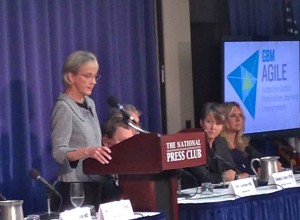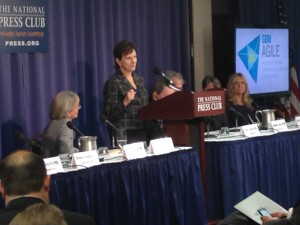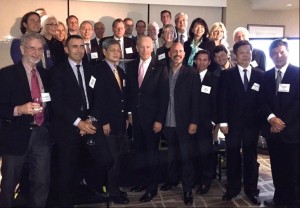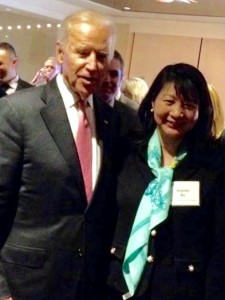A light of hope has been ignited in the fight against GBM, a brain cancer that is widely regarded as incurable and universally fatal.

Dr. Anna Barker, Project Director of the GBM AGILE
On a quiet November morning in downtown Washington D.C. the foremost experts on GBM research and treatment from around the globe, along with a senior member of U.S. FDA leadership, came together to make a significant announcement: we’re launching something new — and it’s going to be a game changer.
Dr. Janet Woodcock of the U.S. Food and Drug Administration shared her insights as the head of thecenter at the FDA that evaluates and approves drugs for all disease. “This is the future we are seeing,” Dr. Woodcock said. “I think this is fabulous and is a tipping point for moving forward.”

Dr. Janet Woodcock, Director of the Center for U.S. Food and Drug Administration
The novel approach, dubbed GBM AGILE, which stands for Adaptive Global Innovative Learning Environment, represents the first-ever adaptive clinical trial for brain cancer. Understanding the difference between an adaptive trial and a traditional trial is critical – especially when it come to a disease like GBM that kills 98 percent of patients in less than three years.
Traditional clinical trials take three to seven years to produce results and cannot be modified once they begin. In this model, patients get only one opportunity and receive only one treatment. By the time results are produced, the treatment protocol is already many years old.
In contrast, adaptive trials test multiple treatments and combinations of treatments in parallel. Adaptive trials are designed to be continuously updated, to incorporate the latest information using a technique called Bayesian Statistics. This feature provides the “Innovative Learning Environment,” in which ineffective treatments can be shut down early, and new treatments can be initiated quickly.
For patients, families and caregivers of those with GBM, the light of hope that surrounds GBM AGILE is precious and inspiring. So much so that Vice President Joe Biden joined the group to offer his encouragement and support.
“You helped me clarify in my mind what had to be done,” Biden told the GBM AGILE coalition. “You have helped me begin to realize how to get my arms around this…there is no reason why we can’t make gigantic strides.”

Vice President Joe Biden with GBM AGILE global researchers
Biden’s oldest son Beau died from GBM earlier this year. The Vice President, who attended the event with his son Hunter and daughter-in-law Kathleen, acknowledged that because of GBM AGILE, patients will no longer wait several years for many small and scattered trials to complete, GBM patients will now be able to benefit more quickly from advances in treatment.
According to GBM AGILE team leader Dr. Anna Barker — former Deputy Directo
r of the National Cancer Institute and current Director of the National Biomarker Development Alliance — the protocol is designed to allow treatments to “Fail Fast” and “Correct Even Faster.” The plan, according to Dr. Barker, is to “begin accepting patients by mid-2016.”

Vice President Joe Biden with Dr. Sujuan Ba, President of the National Foundation for Cancer Research at the GBM AGILE launch event
The day of launch events included world-class neurosurgeons, neuro-oncologists, basic and clinical investigators, and representatives from the GBM advocacy communities all took part. Additionally, the National Foundation for Cancer Research – a highly energetic cancer research charity – has taken a leading role in the project.
NFCR’s President, Dr. Sujuan Ba, who is known for her extensive work on facilitating international collaboration on novel cancer research projects, is serving as a member of the GBM AGILE Executive Committee. During an interview with the PBS show White House Chronicle, Dr. Ba said, “GBM AGILE goes to the heart of NFCR’s mission. This is what we do to help find cures for cancer. One of the things that we bring to the table is help in recruiting researcher to the effort.”
NFCR has recruited three preeminent scientists that they’ve funded for many years into the program: NFCR Scientific Advisory Board Chairman Dr. Webster Cavenee of the Ludwig Cancer Institute; Paul S. Mischel of the Ludwig Cancer Institute; and NFCR Fellow Dr. Alfred Yung of MD Anderson Cancer Center.
To be sure, a coalition as diverse and powerful as GBM AGILE has never come together in support of GBM before. Through the crowdsourcing of knowledge and the inclusion of patients from around the globe this adaptive clinical trial platform is bringing hope for treatments and cures to a disease that sorely needs it. Every patient counts!










